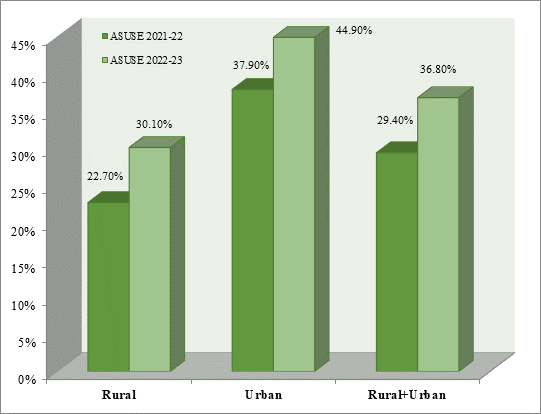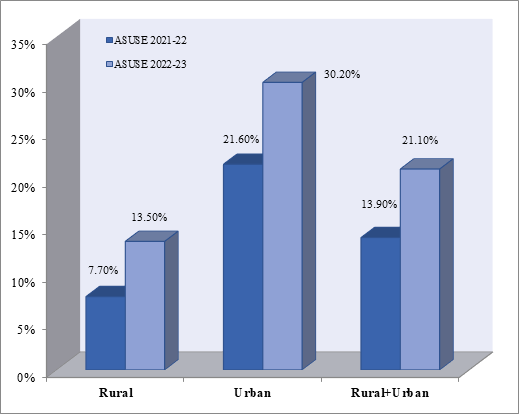(Reference & Survey period: April, 2021 to March, 2022 for ASUSE 2021-22; October 2022 to September 2023 for ASUSE 2022-23)
Unincorporated Sector has witnessed growth in estimated number of establishments (by 5.88%), estimated number of workers (by 7.84%) and in GVA (by 9.83%; in current price) during October, 2022 – September, 2023 as compared to April, 2021 – March, 2022.
Over the two survey periods, the sector has demonstrated enhanced capital investment, greater accessibility to loans, and increased utilization of information technology.
Fixed assets owned by an unincorporated non-agricultural establishment, on average, has risen from Rs. 2,81,013 in ASUSE 2021-22 to Rs. 3,18,144 in ASUSE 2022-23.
The use of internet for entrepreneurial purpose has increased by 7.2% indicating a rapid rate of digitization taking place in the sector.
About 54% of the proprietary establishments in the manufacturing sector were run by women entrepreneur.
The key results of the Annual Survey of Unincorporated Sector Enterprises (ASUSE) for the reference periods of April 2021 to March 2022 (ASUSE 2021-22) and October 2022 to September 2023 (ASUSE 2022-23) in the form of a factsheet were released by the Ministry of Statistics and Programme Implementation (MoSPI), on 14th June 2024 through a press note. The detailed reports and unit level data of these two surveys are now being released through this press note. These are now available in the website of the Ministry (https://www.mospi.gov.in).A brief overview of the survey in terms of coverage, sampling strategy, data collection mechanism, etc., is provided in the Endnote.
The unincorporated non-agricultural sector holds significant importance in the Indian economy, primarily due to its ability to absorb a significant portion of the country’s workforce, its inclusivity in providing employment opportunities to a diverse range of people, including those from rural areas, and those with limited formal education and also its contribution to country’s Gross Domestic Product (GDP).
The survey period of ASUSE 2021-22, particularly the period April – June, 2021, was severely impacted by the second wave of the pandemic and, in turn, the survey got hampered to a great extent. As a result, the overall annual aggregate estimates of ASUSE 2021-22 were affected. For this reason, the estimates of ASUSE 2021-22 have been presented annually (April, 2021 – March, 2022), andalso for the 3-month (April, 2021 – June, 2021) and 9-month period (July, 2021 – March, 2022) separately along-with the annual estimates of ASUSE 2022-23 (October, 2022 – September, 2023) in the factsheet which was published on 14th June 2024 and is available in the website of the Ministry.
Key highlights from ASUSE 2021-22 and ASUSE 2022-23 results
The total number of establishments in the sector increased from 5.97 crore in 2021-22 to 6.50 crore in 2022-23, representing a 5.88% annual growth[1]. Among the broad sectors under coverage, the number of establishments in the other services sectorhas been the most in ASUSE 2022-23 (37.88%) followed by Trade (34.71%) and Manufacturing (27.41%). More than 40% of the establishments in this sector are engaged in either retail trade (around 30%) or manufacturing of wearing apparel (around 11%) as per ASUSE 2022-23. Among the major states, highest number of establishments (rural and urban combined) has been reported in Uttar Pradesh, followed by West Bengal and Maharashtra in ASUSE 2021-22 as well as in ASUSE 2022-23.
During the same period, the Gross Value Added (GVA)[2] which is a key indicator of economic performance of the sector witnessed an annual growth of 9.83%. The top three states in terms of GVA were Maharashtra, Uttar Pradesh and Gujarat in 2021-22 and Maharashtra, Uttar Pradesh and Tamil Nadu in 2022-23.
The unincorporated non-agricultural sector employed about11 crore workers from October 2022 to September 2023, up from 9.8 crore in ASUSE 2021-22. More than one-third of this labour force was engaged in the states of Uttar Pradesh, Maharashtra and West Bengal. Proportion of female workers to total workers has marginally increased from 25.52% in ASUSE 2021-22 to 25.63% in ASUSE 2022-23. About 54% of the proprietary establishments were observed to be headed by female proprietors in the Manufacturing sector both in ASUSE 2021-22 and ASUSE 2022-23.
Among the activity categories, it is observed thatother retail trade, followed by manufacturing of wearing apparel and other community, social and personal services have reported most number of establishments and engaged maximum number of workers at all-India level in both ASUSE 2021-22 and ASUSE 2022-23. The percentage share of these three activity categories in estimated number of total establishments and total workers are given in Table 1.
| Table1: Percentage share of establishments and workers in respect of top 3 activity categories
|
||||
| Activity Category | Number of Establishments | Number of Workers | ||
| ASUSE 21-22 | ASUSE 22-23 | ASUSE 21-22 | ASUSE 22-23 | |
| Other Retail Trade | 33.40 | 30.38 | 31.54 | 29.80 |
| Manufacture of Wearing Apparel | 10.74 | 11.27 | 8.26 | 8.39 |
| Other Community, Social and Personal Service Activities | 8.48 | 9.47 | 7.26 | 8.19 |
Percentage ofregistered establishments has increased from 29.40% in ASUSE 2021-22 to 36.80% in ASUSE 2022-23 thus showing an increasing trend of registration in the sector. Figure 1 illustrates the change in percentages of establishments registered under any acts/authorities, disaggregated by sector, over the two survey periods.
| Figure 1: Percentage of establishments registered under acts/authorities |
 |
The use of internet for entrepreneurial purpose such as, taking orders online, carrying out transactions online or using UPIs, placing orders online, etc. has increased to 13.5% from 7.7% in rural and to 30.2% from 21.6% in urban sector during ASUSE 2022-23 with an overall increase of 7.2%. This shows an improved use of IT and digital platforms and also indicates a fast rate of digitization taking place in the sector. Figure 2, given below shows the change in usage of internet in ASUSE 2022-23 as compared to ASUSE 2021-22.
| Figure 2: Percentage of establishments using internet for entrepreneurial purpose |
 |
Fixed assets owned by an unincorporated non-agricultural establishment, on average, has risen from Rs. 2,81,013 in ASUSE 2021-22 to Rs. 3,18,144 in ASUSE 2022-23 showing an improved capital investment in the sector. At the same time, Outstanding Loan per establishment has increased from Rs. 37,408 in ASUSE 2021-22 to Rs. 50,138 in ASUSE 2022-23, indicating an improvement in availability of loan in this sector.
Endnote: A brief about the coverage, sampling scheme, sample size and data collection mechanism in the Annual Survey of Unincorporated Sector Enterprises (ASUSE):
A. Coverage of ASUSE:
A.1. Geographically, ASUSE covers the rural and urban areas of whole of India (except the villages in Andaman and Nicobar Islands, which are difficult to access).
A.2. Sector-wise, this survey captures unincorporated non-agricultural establishments belonging to three sectors viz., Manufacturing, Trade and Other Services.
A.3. Ownership-wise, unincorporated non-agricultural establishments pertaining to proprietorship, partnership (excluding Limited Liability Partnerships), Self-Help Groups (SHG), co-operatives, societies/trusts etc. have been covered in ASUSE.
B. Sampling Scheme:
The survey has been conducted following a multi-stage stratified sampling scheme, where first stage units (FSUs) are census villages in rural (except for rural Kerala, where Panchayat wards have been taken as FSUs) and UFS (Urban Frame Survey) blocks in urban areas. The ultimate stage units (USUs) are establishments for both sectors. In the case of large FSUs, one intermediate stage of sampling has been done in the form of hamlet groups in rural and sub-blocks in urban.
C. Sample Size:
In ASUSE 2021-22, data were collected from a total of 4,16,269 establishments (2,39,981 in rural and 1,76,288 in urban) from 16,199 surveyed FSUs (8,425 in rural and 7,774 in urban) whereas in ASUSE 2022-23, 4,58,938 establishments (2,58,296 in rural and 2,00,642 in urban) were surveyed from 16,382 FSUs (8,495 in rural and 7,887 in urban).
D. Data Collection Mechanism:
Both ASUSE 2021-22 and ASUSE 2022-23 have been conducted based on area frame and establishments have been listed in the selected FSUs of both rural and urban sector. Mostly, data were collected from the selected establishments through oral enquiry pertaining to the ‘monthly’ reference period barring a few big establishments, which had provided annual data from their audited Books of Accounts. ASUSE 2021-22, the first full-fledged survey on ASUSE, has been conducted in Pen-and-Paper Personal Interview (PAPI) mode; whereas ASUSE 2022-23 has been conducted in Computer Assisted Personal Interview (CAPI) mode.
 Matribhumi Samachar English
Matribhumi Samachar English


